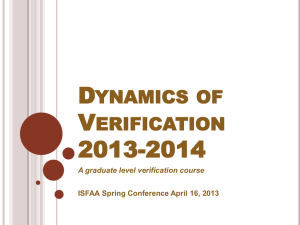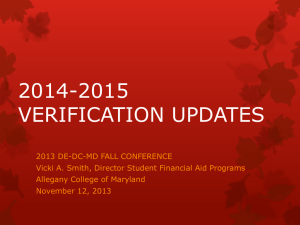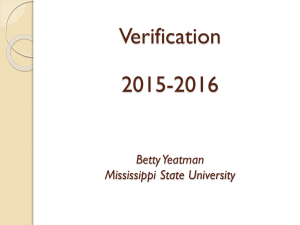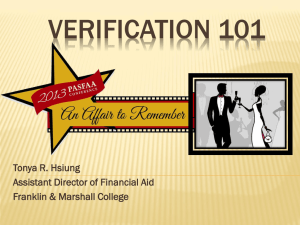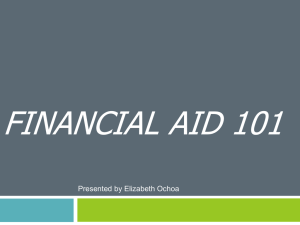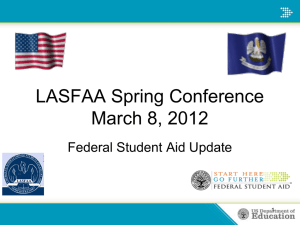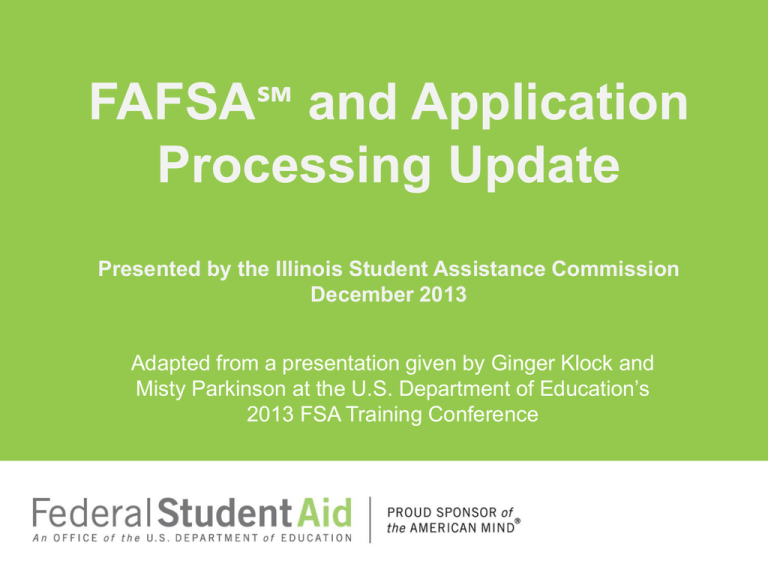
FAFSA℠ and Application
Processing Update
Presented by the Illinois Student Assistance Commission
December 2013
Adapted from a presentation given by Ginger Klock and
Misty Parkinson at the U.S. Department of Education’s
2013 FSA Training Conference
Link to
drafts
of all
supporting
documents
and public
comments
3
Pre-pop Functionality
Issue
A number of entities that interact with students
have expressed interest in partnering with Federal
Student Aid to further simplify the process of
completing the FAFSA.
Solution
Approved partners will offer students the
opportunity to pre-populate data collected by that
partner (for example, a VITA site) into FAFSA on
the Web.
4
5
New Parent Marital Status
Issue
Information about both legal parents is currently included
on a dependent student’s FAFSA only if the parents are
married to each other, creating an inequity.
Solution
A new parent marital status option of “Unmarried, but both
parents living together” will allow for the collection of data
from both legal parents when the parents are not married to
each other. Mother and Father labels will change to Parent
1 and Parent 2. Help text will be significantly enhanced to
provide guidance for parents who file separate tax returns.
6
Change to Definition of “Married”
Issue
The Supreme Court’s recent decision in United
States v. Windsor changed the federal definition of
marriage.
Solution
Text that defines marriage will be updated. Mother
and Father labels will change to Parent 1 and
Parent 2.
7
Parent Updates (paper)
8
Parent Updates (paper)
9
Parent Updates (paper)
10
Student Updates (paper)
11
12
13
14
Conflicting Asset Information
Issue
If a student or parent answers “yes” to the asset
threshold question but then reports assets that
total less than the APA, it appears on the ISIR as
conflicting information for the FAA to resolve.
Solution
An edit will be added to FAFSA on the Web that
prevents this scenario from occurring.
15
16
Tax Filing Status
Issue
Inability to identify instances where the student’s or parents’
marital status conflicts with the tax filing status, resulting in
the possibility that either too much income or not enough
income is being reported on the FAFSA.
Solution
Students and parents will begin reporting their tax filing
status on the FAFSA. The system will compare the tax
filing status with the marital status to determine where
potential discrepancies exist, and message accordingly.
17
Tax Filing Status (paper)
18
19
20
IRS Display Flags
Issue
Some students and parents are not provided with the
option to use the IRS DRT, and FAAs don’t know why. This
makes it difficult to determine what documentation to ask
for when the student is selected for verification.
Solution
New IRS Display Flags will be included on the ISIR, as well
as in FAA Access. These alpha-character flags will identify
the specific reason why a student or parent was not eligible
to use the IRS DRT.
21
IRS Display Flags - Student
•
•
•
•
•
•
•
•
•
•
•
22
Blank = IRS DRT not available
A = Dependent student skipped the income and asset questions – IRS DRT
was not displayed
B = IRS DRT was displayed to student
C = Tax return status not equal to “Already completed” – IRS DRT was not
displayed
D = Marital status date greater than or equal to January 2014 – IRS DRT was
not displayed
E = First three digits of SSN are 666 – IRS DRT was not displayed
H = Student amended his/her tax return – IRS DRT was not displayed
J = Student filed a Puerto Rican or Foreign tax return – IRS DRT was not
displayed
K = Student is married and tax return filing status is Married Filed Separate
Return – IRS DRT was not displayed
L = Student is married and tax return filing status is Head of Household – IRS
DRT was not displayed
M = Conflict between the student’s marital status and tax return filing status –
IRS DRT was not displayed
IRS Display Flags - Parent
•
•
Blank = IRS DRT not available
A (if student is dependent) = Dependent student has special circumstances – IRS DRT
was not displayed
A (if student is independent) = Independent student skipped the parent questions –
IRS DRT was not displayed
B = IRS DRT was displayed to parent
C = Tax return status not equal to “Already completed” – IRS DRT was not displayed
D = Marital status date greater than or equal to January 2014 – IRS DRT was not
displayed
E = First three digits of SSN are 666 – IRS DRT was not displayed
F = Non-married parent or both married parents entered all zeroes in SSN – IRS DRT
was not displayed
G = Neither married parent entered a valid SSN – IRS DRT was not displayed
H = Parent amended his/her tax return – IRS DRT was not displayed
J = Parent filed a Puerto Rican or Foreign tax return – IRS DRT was not displayed
K = Parents are married and tax return filing status is Married Filed Separate Return –
IRS DRT was not displayed
L = Parents are married and tax return filing status is Head of Household – IRS DRT
was not displayed
M = Conflict between the parents’ marital status and tax return filing status – IRS DRT
was not displayed
N = Parents’ marital status is “Unmarried and both parents living together” – IRS DRT
was not displayed
•
•
•
•
•
•
•
•
•
•
•
•
•
23
Messaging for Corrections
Issue
Some students and parents return to FAFSA on
the Web to use the IRS DRT, add a school code,
or make other corrections, but don’t submit those
corrections.
Solution
Messaging that displays will be modified when a
user returns to FAFSA on the Web after
transferring data from the IRS. Additionally, an email will be sent to students with a saved
correction after seven days of inactivity,
encouraging them to return to FAFSA on the Web
and submit the corrections.
24
25
Increased Field Lengths
Issue
The number of characters allowed in the student and
parent financial fields needs to be changed in order to
accurately report income and EFC for high cost
institutions with high income students.
Solution
Increase lengths of all income and asset fields and
calculated EFC values to allow for more characters.
26
150% Subsidy Loan Limit
Issue
On July 6, 2012 President Obama signed into Public Law
112-141, the elimination of the subsidy on Direct Subsidized
Stafford Loans when a “new borrower’s” enrollment exceeds
150% of the published program length (DCL: GEN-13-13).
Challenges
Upon receipt of a Direct Loan actual disbursement with a first
disbursement date on or after July 1, 2013, COD must
determine if the borrower meets the definition of a “new
borrower” to confirm that the 150% subsidy limit applies to
the borrower.
27
150% Subsidy Loan Limit
Solution
• Identify “new borrowers” starting July 1, 2013 (Phase 1)
• Identify when a borrower reaches the 150% threshold
and take appropriate actions (Phase 2)
• Continuously monitor “new borrowers” enrollment to
evaluate future enrollment impacts to students’ 150%
limitations (Phase 2)
A “new borrower” is defined as any borrower without an outstanding loan
balance on July 1, 2013 or thereafter (Direct Subsidized, direct unsubsidized,
PLUS loan [parent PLUS and grad PLUS], FFEL, consolidation and/or
converted TEACH).
28
150% Subsidy Loan Limit
The following NSLDS fields will be added to the ISIR:
Added
Subsidized Usage Limit Applies Flag (SULA)
Subsidized Loan Eligibility Used (SLEU)
•
•
•
•
29
Value
Y/N
000v000
These fields will be passed from NSLDS to CPS starting with
2014-2015 at the borrower level during pre-screening
A SAR Comment 267 will be triggered when SULA Flag is set to Y
New NSLDS Post-Screening Reason Code 25 value will be
added: Subsidized Usage Applies Flag Status Change
https://federalregister.gov/a/2013-11515 (DCL: GEN-13-13)
150% Subsidy Loan Limit
30
•
SAR Comment 267
• There is a limit to the total amount of subsidized federal
student loans that you may receive. Please visit
Studentaid.gov and select Types of Aid/Loans for more
information.
•
Reason Code 25 will be added to the NSLDS Postscreening for a Subsidized Usage Limit Applies Flag
status change.
Update NSLDS Fraud Loan Flag
Issue
NSLDS receives records from the Office of Inspector
General (OIG) that indicate someone has been convicted
of fraudulently obtaining federal loans and is no longer
eligible for aid.
Solution
Beginning January 1, 2014:
•
•
•
31
NSLDS records that receive a flag value of “Y” in the NSLDS Fraud
Loan Flag field will no longer have a SAR C Code
Records will now receive Reject Reason 24 and SAR Comment 272
Effective for 2013-14 and 2014-15
Update NSLDS Fraud Loan Flag
•
32
SAR Comment 272:
• The National Student Loan Data System (NSLDS)
indicates that you have one or more student loans
that may have been obtained fraudulently. You are
not eligible to receive any federal student aid until
this issue is resolved.
Applicants Younger than 13
Issue
Provide a COPPA-compliant process to allow students
younger than 13 to apply for Title IV.
Solution
• Implement a special-handling paper process that:
Will bypass the Date of Birth edit
– Will not allow the student to provide an e-mail address
–
•
•
33
Student will receive a paper SAR and the school will
receive an ISIR
The Renewal Process will not be available for these
applicants
Applicants Younger than 13
Correction Process
– If corrections are required,
– the
student/parent can submit them via the paper SAR
correction process
– The FAA can make corrections, except they cannot provide
an e-mail address
34
IRS Data Retrieval Tool
35
IRS Data Retrieval Tool
•
•
•
•
•
•
•
Embedded link within FAFSA on the Web
Applicants must successfully authenticate using information from the filed
tax return
Tax return data is available only after the return has posted to the IRS
system
Retrieves specific tax return data from an originally filed tax return and
displays data on applicants’ browser
Upon request, transfers the displayed data directly in response to specific
questions on the FAFSA
IRS Transcript usually not required if data is successfully transferred and
not modified by applicant
2014 changes include Language toggle link, display of filing status and
“per computer” values
36
IRS Transcripts
Tax Return transcripts
•
- Anyone who filed a tax return, including first time filers
Tax Account transcripts
•
–
Record of Account
•
–
Anyone who filed a tax return/amended tax return, including first time filers
Verification of Non-filing
•
–
Non-filer; letter not a transcript
Information Returns Transcripts (W-2, 1099, 1098, 5498)
•
–
Anyone who has income that was reported to the IRS
Tax Return Database View (TRDBV)
•
–
37
Anyone who filed a tax return/amended return, including first time filers
Taxpayer who filed an original tax return and can not get a normal
transcript through other methods because of duplicate tax return posting
IRS Transcripts
•
Basic
information from
tax return
•
Line by line
presentation of
tax return
38
IRS Transcripts: Availability
Electronically filed Tax Returns
•
–
–
Paper Tax Returns
•
–
–
$0 balance/refund returns: Generally available 8-11 weeks after the IRS
receives the return
Balance due/partial pay returns: Generally available by end of July
Amended Returns
•
–
–
Must be filed as a paper return
Generally available 12 weeks after the IRS receives the amended return
ID Theft Cases
•
–
–
39
$0 balance/refund returns: Generally available 2-3 weeks after the return
has been accepted by IRS
Balance due/partial pay returns: Generally available by end of June or 3-4
weeks after the IRS receives the full/final payment
Must be filed as a paper return
Generally available 8-11 weeks after the IRS receives the duplicate return
IRS Transcripts – Get Transcript
•
•
Get Transcript is a new IRS online service that will
provide an electronic PDF version of official IRS
Transcripts, launching early in the filing season 2014
Key features:
–
For individual filers
– Delivers all available Transcript types and/or Letters of Non-Filing
– Accessible after taxpayers authenticate
– Provides immediate display of transcript via PDF file; users can
view, print, and save the file
•
•
40
Get Transcript is IRS’s preferred Transcript delivery
channel
www.irs.gov/transcript
Get Transcript
•
Step 1 (Optional):
Choose reason
for requesting
transcript.
Receive
suggestion
•
Step 2: Access
available
Transcripts and/or
Letters of NonFiling, organized
by type
41
Other IRS Transcript Options
• Transcript Toll free telephone line
– Self service; 5-10 calendar day delivery to the address on file
– 1-800-908-9946
• IRS2Go
– Self service; mobile app; 5-10 calendar day delivery to the address on file
– Available for Android and iOS (Apple) mobile devices
• Order a Transcript
– Self service; web app; 5-10 calendar day delivery to the address on file
– http://www.irs.gov/Individuals/Order-a-Transcript
• Form 4506-T
– Manual process; up to 10 business days to process request and send
transcript to the specified address
– Third party address identified on Line 5 must be very specific
42
Verification
43
2014-15 Verification
•
Federal Register Notice, published June 13, 2013,
Free Application for Federal Student Aid (FAFSA)
Information To Be Verified for the 2014-15 Award Year
•
Dear Colleague Letter GEN-13-16, Published June 13,
2013, 2014-15 Award Year: FAFSA Information to be
Verified and Acceptable Documentation
44
2014-15 Verification
•
Retained all items subject to verification in 2013-14
•
Added one new item-•
Other untaxed income and benefits
45
2014-15 Verification Groups
Verification
Tracking Flag
Verification Tracking Group
Verification Description
V1
Standard Verification
Record selected because conditions based on statistical
analysis error-prone risk model were met
V2
Reserved for FSA Use Only
N/A
V3
Child Support Paid Verification
Record selected for Child Support Paid criteria only
V4
Custom Verification Group
Record selected for Identity criteria and SNAP/Child
Support Paid
V5
Aggregate Verification Group
Record selected for Identity criteria, “Standard
Verification” criteria and SNAP/Child Support Paid
V6
Household Resources Verification
Group
Record selected for Other untaxed income,
“Standard Verification” and SNAP/Child Support Paid
46
2014-15 Verification
•
Documentation of untaxed income and benefits
•
Untaxed income information reported in Question 45 for
the student and spouse and Question 94 for the
dependent student’s parents
•
If the verified income does not appear to provide sufficient
financial support, the student or parents must explain how
the family was supported during the 2013 calendar year
47
2014-15 Verification
•
•
•
Small number of students will be selected to verify
household resources
Provided extensive sample verification text that may be
used for verification
Three pages that collect more detailed information on
Q45 and Q94
•
•
One page that collects optional additional information
Rely on the FAA to make the determination that the family
had sufficient resources
48
Verification
Data from January 1, 2013 to November 1, 2013
Verification Selection
• Indicate of the 5,722,505 selected for verification from the
18,827,577 who applied to date
•
•
.9% (51,533) were placed in the V4 – Customized Verification Group
1.45% (82,889) were placed in the V5 – Aggregate Verification Group
Unusual Enrollment History (Not part of Verification)
• Indicate of 18,827,577 who applied to date
•
•
49
.93% (175,567) were placed in the UEH Flag #2 category
.14% (26,496) were placed in the UEH Flag #3 category
Verification
Issue
FSA continues the process of refining verification selection
efforts related to Identity criteria (V4 and V5) based on data
analysis, resources and reporting tools.
Enhancements
• New Reject Reason 23 will be applied when certain
conditions related to identity issues are met
–
•
Reject 23 can only be overridden by FSA
–
50
SAR Comment 281 will be generated
A system-generated SAR will be sent with SAR Comment 283
Verification
SAR Comment 281
• We cannot process your FAFSA because of issues
related to your eligibility. Contact Federal Student
Aid at 202-377-3889 for assistance within 30 days
from the date of this letter.
SAR Comment 283
• Issues related to your FAFSA have been resolved
and processing of your FAFSA may continue.
51
Verification
Issue
Provide an efficient method for FAAs to report the
verification results for records selected with the V4
and V5 Verification Tracking Groups.
Solution
FAA Access will be updated to add Identity
Verification Results functionality to allow FAAs to
enter results individually or by file upload.
52
Verification
FAA Access
will be updated
to add Identity
Verification
Results to the
home page
53
Verification
• The FAA will
enter SSN,
Name ID, and
Verification
Results from a
dropdown menu
on this page
• Click “Add
SSNs” and enter
additional ones
54
Verification
Dropdown options will be
• Verification completed in person,
no issues found
• Verification completed remotely, no issues found
• Verification attempted, issues found with identity
• Verification attempted, issues found with HS
completion
• No response from applicant or unable to locate
55
Verification
Coming in April 2014
2014-2015
FAAs will be able to create and upload a flat file
56
Verification
FAAs will get a confirmation page with the results
submitted and can print the page for their records
57
Important Dates
•
January 1, 2014
FAFSA on the Web available to students
•
January 1, 2014
FAA Access to CPS Online available to financial
aid administrators
•
January 3, 2014
2014-2015 CPS begins processing
58
Excerpts from ED’s 2014-2015
FAFSA on the Web Preview
Presentation
See December 2, 2013
Electronic Announcement at ifap.ed.gov for
complete set of PowerPoint slides
61
62
63
64
65
66
67
68
69
MY FAFSA Pages
•
•
The My FAFSA page is a navigation tool for the student when
accessing the FAFSA on the Web site.
This page will provide the following options and dynamic
messaging based on the status of the students FAFSA:
•
•
•
•
•
•
Start 2014-2015 FAFSA
File a FAFSA Renewal
Make FAFSA Corrections
View the Student Aid Report
View Correction History
Provide Missing Signatures
70
71
Resources
72
www.fafsa.gov
73
74
Demo Sites
• FAFSA on the Web and FAA Access to CPS
Online Web Demonstration sites will be
available on December 29, 2013
– To access sites, go to http://fafsademo.test.ed.gov
– Enter:
• User Name: eddemo
• Password: fafsatest
75
FSA Conference Presentations
•
Available at fsaconferences.ed.gov/
•
•
FAFSA and Application Processing
Sessions
•
•
•
•
•
76
Or link to from ifap.ed.gov home page
Welcome & Federal Update (General Session 1)
FAFSASM & Application Processing Update (General
Session 2)
Verification (General Session 3)
Consumer Information: FSA & IRS Expand
Collaboration! (Session 35)
FAFSA on the Web Skip Logic (Session 37)
77
78
ifap.ed.gov
79
80
DCL ID: GEN-13-25
•
•
•
81
Publication Date: December 13, 2013
Subject: Supreme Court Ruling on the Defense of
Marriage Act and the Implications for the Title IV Student
Financial Assistance Programs
Summary: This letter provides important information on
the use of "marriage" and "spouse" in the Title IV Student
Financial Assistance Programs and on completion of the
Free Application for Federal Student Aid (FAFSA), under
the Supreme Court’s decision invalidating Section 3 of the
Defense of Marriage Act (United States v. Windsor).
Excerpt from DCL ID: GEN-13-25
•
82
For purposes of the Title IV HEA programs, a student or a parent is
considered married if the student or parent was legally married in any
domestic or foreign jurisdiction1 that recognizes the relationship as a valid
marriage, regardless of where the couple resides. The Department is
applying a “place of celebration” rule and, accordingly, has determined that
any legal marriage that is recognized by the jurisdiction in which the marriage
was celebrated will be recognized for Title IV HEA program purposes without
regard to whether the marriage is between persons of the same sex or
opposite sex, and without regard to where the couple resides. This
determination applies to both a student and to the parents of a dependent
student. It also applies to a student attending an institution located in a
jurisdiction that recognizes same-sex marriage and in a jurisdiction (e.g., a
state) that does not recognize same-sex marriage. Further, this determination
applies only to marriages and does not apply to registered domestic
partnerships, civil unions, or similar formal relationships recognized under
state law. 2 Finally, this determination is relevant to all questions concerning
marriage and marital status on the FAFSA.
DCL ID: GEN-13-26
•
•
•
83
Publication Date: December 13, 2013
Subject: 2014-2015 Financial Aid Shopping Sheet
Summary: This letter provides updates, HTML
specifications, and the Institutional Metric Data file for the
2014-2015 Financial Aid Shopping Sheet
QUESTIONS?
84


